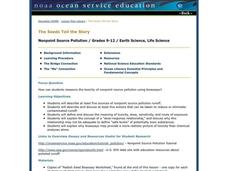Smarter Than Smoking
Secrets They Keep Poster
A colorful, thought-provoking infographic identifies 12 harmful chemicals found in cigarette smoke. It provides a sober warning for smokers and those exposed to secondhand smoke.
Curated OER
The Dose Makes The Poison
Learners observe beakers of water that contain different amounts of a mystery chemical. They discuss how each amount of the chemical might affect them if the chemical was beneficial or harmful to their bodies.
Curated OER
Methamphetamine: A Threatening Scourge on Teens, Families, and Communities
Students examine how methamphetamine alters the brain and the facts about it. In this brain chemical addiction lesson plan students read articles on methamphetamine and take a quiz.
Curated OER
Household Toxic Chemicals
Young scholars take a home toxins survey and determine possible substitutions for household toxins.
NOAA
Chemosynthesis and Hydrothermal Vent Life
What's life like in a hydrothermal vent? Find out in part five of a 13-part series. Learners journey to one of the harshest environments on the planet, the hydrothermal vent, to learn about the creatures that survive the extreme...
Beyond Benign
The Story of Cosmetics Video Assessment
Does your shampoo contain carcinogens? Scholars learn how cosmetic companies create and market their products, many of which contain toxic chemicals. They examine the bias and consumer responsibilities in the industry.
Curated OER
Subsurface Contamination of Groundwater
High schoolers watch a demonstration with a balloon filled with water being buried in a milk container that has been cut length wise and filled with sand. Students are told that there is an underground storage tank filled with a...
Curated OER
ToxMystery Lesson Plan 2 : Case Book: Catch That Hazard!!!
Students explore toxic hazards. In this personal health lesson, students discover appropriate uses for household chemicals as they identify potentially harmful products in their homes.
Beyond Benign
SLS Toxicology Test
Ingredients in your shampoo are toxic enough to kill plants. The 16th installment of the series of 24 tests the toxicity level of various concentrations of SLS, a chemical found in nearly all shampoo. Learners prepare percent solutions...
National Nanotechnology Infrastructure Network
The Effects of Gold and Silver Nanoparticles on Brine Shrimp: A Toxicology Study
Who doesn't love gold and silver? Brine shrimp, that's who! Learners conduct an experimental activity to monitor the toxicity of gold and silver nanoparticles on brine shrimp. They synthesize solutions to expose the brine shrimp to and...
Curated OER
Does Dye Die? Foreign Chemicals in Our Environment
Students conduct an experiment to observe photolysis in the lab. In this chemistry lesson, students explain the mechanism behind photolysis. They test the impact of a non-toxic marker to plant metabolism.
Beyond Benign
Is It Easy Being Green Game Show
Is it possible to create an environmentally friendly shampoo? Learners accept this challenge in the fifth lesson in a green chemistry series of 24. The analysis of their shampoo ingredients must address pH, exothermic reactions, and...
Beyond Benign
Shampoozled—Part 1: Formula Calculation
Time for your classes to show off what they've learned! The 11th installment in the series of 24 uses concepts learned in the previous 10 lessons to create the perfect shampoo formula. Their formulas consider both sustainability and...
Curated OER
Toxicology and Living Systems
High schoolers investigate how toxic chemicals affect biological systems. They determine the toxic dose of a chemical that inhibits seed germination in a Brassica rapa. They investigate the effect of environmental tobacco smoke on human...
Curated OER
In Katrina's Wake
You will need to go to the National Center for Biotechnology Information website to obtain the article, "In Katrina's Wake." Have your class read it and examine maps of where toxic chemicals were located in Louisiana at the time,...
Curated OER
Defining Hazardous Waste
Students examine the relationship between hazardous substances and hazardous waste. They identify toxic chemicals and how they are disposed of. They work together to answer questions about how they are improperly used.
Beyond Benign
Daphnia Bioassay LD50
De-icing materials may have a harmful effect on our environment; have your class perform an experiment to test the nature of these effects. Scholars monitor the survival rate of a sample of daphnia as the concentration of a de-icing...
Royal Society of Chemistry
Lead Compounds: Precipitation Reactions and Pigments—Microscale Chemistry
Colorful lead compounds never fail to impress! Solubility scholars examine a series of double replacement reactions involving lead nitrate and record their observations. The second part of the experiment illustrates the differences...
Polar Trec
Bioaccumulation of Toxins
In 2015, Peter Cook found that sea lions with high levels of exposure to toxins suffered permanent brain damage if they survived at all. Scholars learn about the accumulation of toxins at various levels of the food chain. Using...
Curated OER
Toxicology 2: Finding the Toxic Dose
Students brainstorm with group partners to decide upon a chemical they would like to test, and outline a procedure for their investigation. They then present in groups their ideas to the rest of the class as well as the chemical they...
Curated OER
The Great Hungarian Toxic Disaster
Ninth graders examine the the toxic spill in Hungary. In this Hungarian lesson, 9th graders read an article and answer guided questions. Students write an email to their teacher explaining the causes and effects of the Toxic disaster.
Curated OER
Toxics Lesson Plan
Students discover that chemicals and toxics are all around us and we can make a choice whether or not to use them.
Curated OER
What's Hiding in Your Home Cabinets?
Pupils analyze a variety of products found in their own homes to determine their toxic content. They identify words such as caution, warning or danger and relate them to their relative toxicity levels.
Curated OER
The Seeds Tell the Story
Students explore sources of pollution runoff and actions that can be taken to reduce runoff. In this pollution lesson students complete a worksheet and see why bio-essays may provide a more realistic picture of toxicity.

























